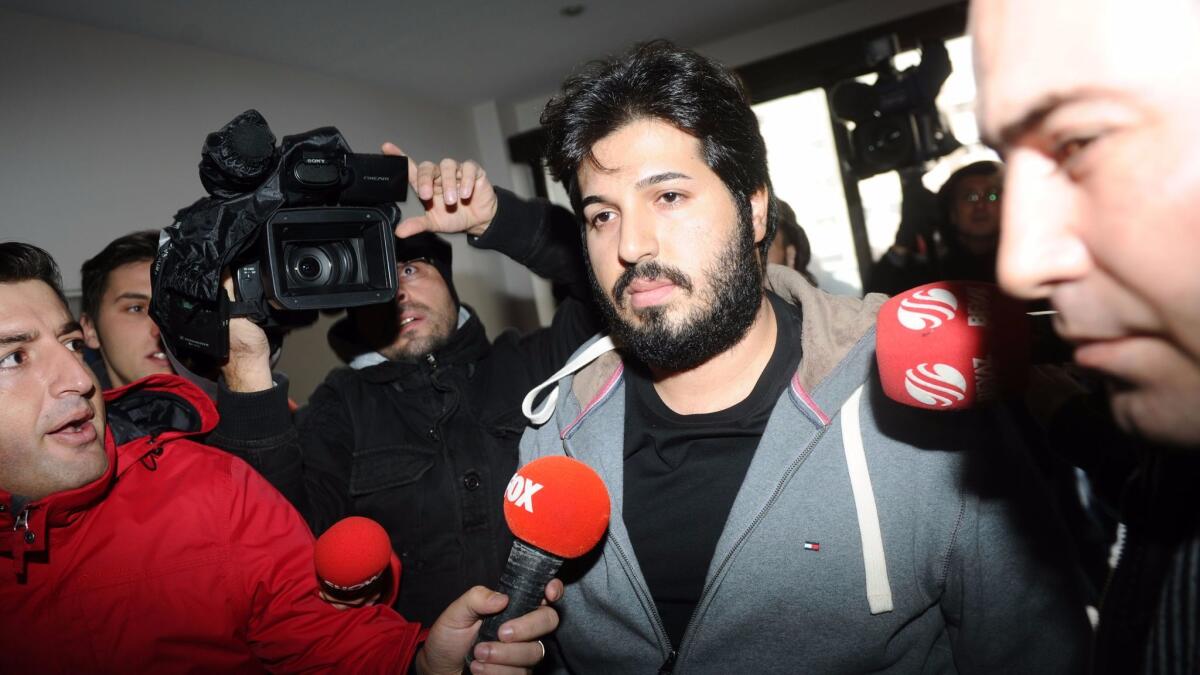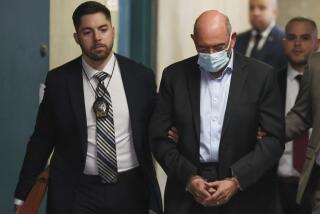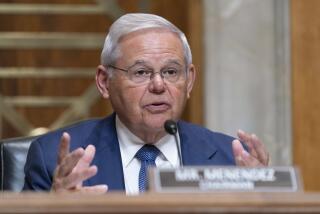Turkish gold trader Reza Zarrab makes plea deal in Iran sanctions case

A Turkish-Iranian gold trader with ties to Turkish President Recep Tayyip Erdogan has pleaded guilty in a billion-dollar economic sanctions-busting and money laundering scheme, a U.S. prosecutor said in federal court Tuesday morning.
Assistant U.S. Atty. David Denton said Reza Zarrab, who pleaded guilty, will serve as a government witness in the case against another defendant. Whether Zarrab would cooperate with the government had been the subject of increasing speculation in recent weeks.
“He can tell you the inside story,” Denton told jurors in opening statements at the trial of co-defendant Mehmet Hakan Atilla.
Denton described Zarrab as a mere front man for a scheme masterminded by Atilla, a former deputy general manager of a state-controlled bank in Turkey, Halkbank.
Atilla, arrested at New York’s John F. Kennedy airport in March, was the only one of nine defendants in the case who was on trial Tuesday.
Zarrab, Atilla and the others have been charged with orchestrating a scheme in which they exported gold in exchange for Iranian oil, in violation of U.S. sanctions, and used a series of front companies, false documentation and bribes to make illegal transactions through U.S. banks.
Zarrab’s plea was unsealed Tuesday afternoon. He pleaded guilty on Oct. 26 to all six counts of fraud, money laundering and sanctions violations with which he was charged. He also pleaded guilty to a new charge of conspiring to bribe a corrections officer to smuggle contraband, including cellphones and alcohol, to him while in federal detention.
“Atilla was the scheme’s architect,” Denton said.
But defense attorney Victor Rocco characterized Atilla, 47, as a hardworking civil servant who had taken no bribes and amounted to “a hapless and helpless pawn” in a plot orchestrated by Zarrab, whose credibility Rocco sought to undermine.
“He made the deal of a lifetime” by pleading guilty and agreeing to cooperate in exchange for possibly remaining in the U.S. with his family under a witness protection program, Rocco said.
Rocco described Zarrab, 34, as an extravagantly wealthy businessman who paid tens of millions of dollars in bribes and “waged economic jihad against the U.S.” to make a fortune for himself.
“There will be a tsunami of evidence” presented in the trial, Rocco said. “That evidence … is essentially about one man and his scheme: Reza Zarrab.”
The trial has important implications domestically in Turkey and for U.S.-Turkey relations.
The scheme was first investigated by Turkish police in 2013. That investigation, which implicated high-level government officials, was ultimately shut down under Erdogan, who alleged that it was being perpetrated by followers of the Islamic cleric Fethullah Gulen — whom the Turkish government also accuses of leading a coup against it in 2016.
Denton said Tuesday that evidence gathered in that investigation, which Erdogan has described as fabricated, would finally “see the light of day” in the trial.
Nate Schenkkan, a Turkey scholar at the research organization Freedom House, said that would likely feed the Turkish government’s ire over the case.
“They see this [trial] as the political leadership of the U.S. … continuing a political attack that started in Turkey,” he said.
Testimony by Zarrab, who is expected to take the witness stand Wednesday, could also potentially implicate Erdogan, other government officials and Turkish banks.
Denton said in his statements Tuesday that before the scheme began, in 2011, Turkey exported a total of $55 million in gold. A year later, it exported $6.3 billion in gold, he said. The increased exports would have reduced Turkey’s apparent trade deficit and made its economy look stronger.
“Turkey wanted to demonstrate that its trade deficit was better than it was,” Schenkkan said.
The case is putting additional stress on the U.S.-Turkey relationship, which has already been strained by U.S. support of Kurdish soldiers in the fight against Islamic State, among other things. The Turkish government views the Kurdish militia as linked to a separatist terrorist group.
Erdogan has repeatedly asked the U.S. government to free Zarrab, and news reports have indicated that special counsel Robert S. Mueller III is investigating whether Erdogan offered former national security advisor Michael Flynn money to secure his help in extraditing Gulen and releasing Zarrab.
Zarrab, a prominent businessman who is married to a Turkish pop star, was arrested in March 2016 when he arrived in the U.S. for a family trip to Disney World with $100,000 in cash, officials said.
Earlier this month a federal Bureau of Prisons website listed him as released, but prosecutors said he remained in federal custody — a sign that he was cooperating.
On Monday night Atilla’s defense team tried to get the trial delayed two weeks, but the judge refused. The trial is expected to last three to four weeks.
Twitter: @AgrawalNina
UPDATES:
3:40 p.m.: This article was updated throughout with staff reporting and additional details.
This article was originally published at 8:00 a.m.
More to Read
Start your day right
Sign up for Essential California for news, features and recommendations from the L.A. Times and beyond in your inbox six days a week.
You may occasionally receive promotional content from the Los Angeles Times.






